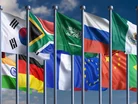History of G20 – what it is, when it started, what it does

World leaders are meeting in Bali, Indonesia, for the 17th annual G20 summit where issues of food security, energy security, and global economic stability is expected to dominate talks.
Indonesian President Joko Widodo welcomed 17 leaders of the G20 countries who confirmed attendance, among them US President Joe Biden and Chinese President Xi Jinping, who met face-to-face in Bali the day before the start of the summit.
According to a White House statement, the two leaders spoke candidly about their respective priorities and intentions across a range of issues, welcoming “ongoing efforts to address specific issues in U.S.-China bilateral relations”.
What is the G20 and what does it achieve?
Taking place annually since 1999, the G20 forum convenes both the world’s major advanced and emerging economies to cooperate on the most important issues of the global economic and financial agenda.
Supported by several international organisations including the IMF, UN, and World Bank, the G20 is made up of 19 countries and one economic region, which together represent around 90% of global GDP, 80% of global trade, and two-thirds of the world’s population.
The 19 member states include Argentina, Australia, Brazil, Canada, China, France, Germany, India, Indonesia, Italy, Japan, Mexico, Russia, Saudi Arabia, South Africa, South Korea, Turkey, UK, US – with the EU making up the 20th member.
The objectives of the G20 forum, which is chaired by a different member each year, are to coordinate policy aimed at achieving global economic stability and sustainable growth, promote financial regulations that reduce risks and prevent future financial crises, and create a new international financial architecture.
G20 – how it began and evolved
Formed in 1999 in response to the Asian financial crisis, the G20 (Group of Twenty) was initially focused on general macroeconomic policy but has since broadened into a forum that addresses urgent issues, from food security to climate change.
Originally a convening of the Finance Ministers and Central Bank Governors of advanced and emerging countries, the G20 first took place in Berlin, Germany, and has been held annually since in different countries.
In 2008, the G20 was raised to Summit level to address the global financial and economic crisis of 2008 with the First Summit hosted by the US President in Washington. Here, leaders discussed the causes of the crisis and agreed to implement an Action Plan around the objectives of restoring global growth, strengthening the international financial system, and reforming international financial institutions.
Subsequent Summits with world leaders, held annually, have taken place in London (2009), Toronto and Seoul (2010), Cannes (2011), Mexico (2012), St Petersburg (2013), Sydney (2014), Istanbul (2015), Hangzhou (2016), Baden-Baden (2017), Fukuoka (2019), Rome (2021) and other countries addressing the varied economic issues of the time – from reviewing the global economic situation in the backdrop of the Eurozone/Greek crisis in Cannes in 2011 to discussing steps to tackle climate change and a pandemic recovery in Rome in 2021.
Among achievements from the G20’s policy agenda over the 17 years:
- London – 2009 Agreement on a US$1.1 trillion injection of financial aid into the global economy to avert the threat of global depression.
- Toronto – 2010 ‘Development’ was introduced or the first time on the G20 agenda to be addressed through a High-Level Development Working Group (DWG)
- Cannes – 2011 Adoption of an action plan to support the development and deepening of local bond markets
- St Petersburg – 2013 Leaders agreed on a roadmap towards strengthening oversight and regulation of shadow banking
The next G20 is expected to take place in September 2023 in India, by which time India is predicted to have overtaken China as the most populated country on the planet and Brazil and South Africa are planned for 2024 and 2025, respectively.
- Businesses 'running blind' in the fight against cyber crimeDigital Strategy
- Five Minutes With: Björn Dufwenberg, MD at Strat7 AdvisoryLeadership & Strategy
- Building bridges between management and productivityLeadership & Strategy
- How analogous inspiration can solve your strategic deadlockLeadership & Strategy
Featured Articles
SAP has announced it has appointed a new President for a newly-created EMEA region, aiming to make the most of the opportunities of cloud and AI technology
Technology giant SAP has expanded its portfolio with the acquisition of LeanIX, a leader in enterprise architecture management (EAM) software
To help businesses achieve increased productivity, Siemens and Microsoft are deepening their partnership by showcasing the benefits of generative AI




